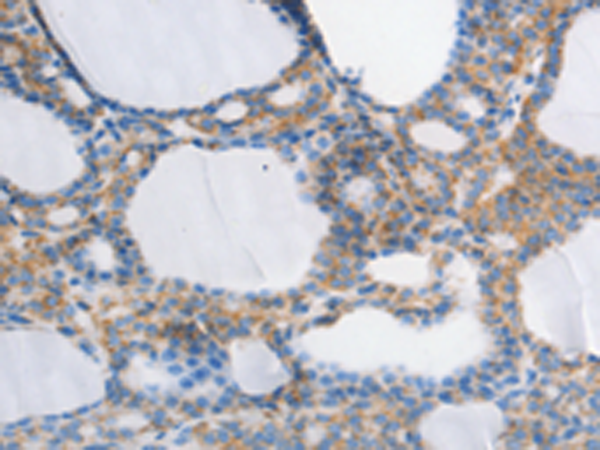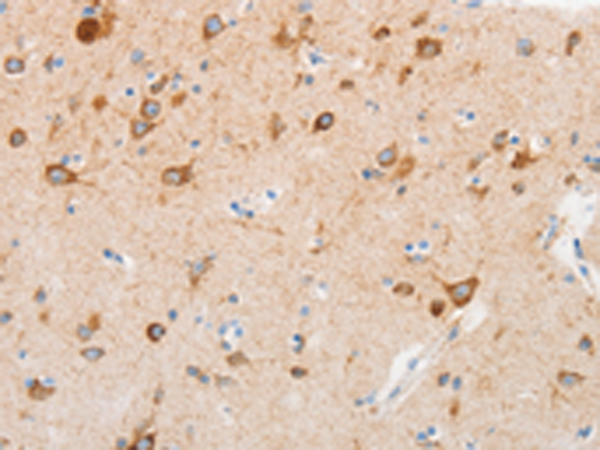

| WB | 咨询技术 | Human,Mouse,Rat |
| IF | 咨询技术 | Human,Mouse,Rat |
| IHC | 1/25-1/100 | Human,Mouse,Rat |
| ICC | 技术咨询 | Human,Mouse,Rat |
| FCM | 咨询技术 | Human,Mouse,Rat |
| Elisa | 1/2000-1/5000 | Human,Mouse,Rat |
| Aliases | DRCC1, MUC-13 |
| Host/Isotype | Rabbit IgG |
| Antibody Type | Primary antibody |
| Storage | Store at 4°C short term. Aliquot and store at -20°C long term. Avoid freeze/thaw cycles. |
| Species Reactivity | Human |
| Immunogen | Synthetic peptide of human MUC13 |
| Formulation | Purified antibody in PBS with 0.05% sodium azide and 50% glycerol. |
+ +
以下是关于MUC13抗体的3篇参考文献的简要信息,供参考:
---
1. **文献名称**:*MUC13 overexpression in colorectal cancer promotes development and correlates with poor prognosis*
**作者**:Sheng YH, et al.
**摘要**:该研究利用特异性MUC13抗体检测结直肠癌组织中MUC13的表达,发现其过表达与肿瘤侵袭性及患者生存率降低相关,提示MUC13可能作为预后标志物和治疗靶点。
2. **文献名称**:*MUC13 protects colorectal cancer cells from apoptosis by regulating PI3K-AKT pathway*
**作者**:Ponnusamy MP, et al.
**摘要**:通过抗体验证MUC13在结直肠癌细胞中的功能,发现其通过激活PI3K-AKT信号通路抑制细胞凋亡,为靶向MUC13的抗体药物开发提供理论依据。
3. **文献名称**:*Development of a novel monoclonal antibody against MUC13 for targeted therapy of gastric cancer*
**作者**:Zhang J, et al.
**摘要**:研究团队开发了一种靶向MUC13的单克隆抗体,体外实验证实其能特异性结合胃癌细胞并抑制增殖和迁移,为MUC13抗体在胃癌治疗中的应用奠定基础。
---
以上研究均涉及MUC13抗体的开发或应用,涵盖肿瘤标志物验证、机制探索及治疗潜力评估。如需具体文献来源,建议通过PubMed或Google Scholar检索标题或作者获取全文信息。
The MUC13 antibody targets the MUC13 protein, a transmembrane mucin predominantly expressed on epithelial cells of the gastrointestinal, respiratory, and reproductive tracts. MUC13 plays critical roles in cell signaling, adhesion, and immune modulation through its extracellular tandem repeat domains, which are heavily glycosylated, and its cytoplasmic tail that interacts with kinases like EGFR. Overexpression of MUC13 is implicated in cancer progression, metastasis, and therapy resistance, notably in colorectal, gastric, ovarian, and pancreatic cancers. Its dysregulation disrupts apoptosis and promotes oncogenic pathways (e.g., NF-κB), making it a biomarker for aggressive tumors.
MUC13 antibodies are essential tools for studying its expression, localization, and function in both normal and diseased tissues. Diagnostic antibodies help detect MUC13 in clinical samples via immunohistochemistry or ELISA, aiding cancer diagnosis and prognosis. Therapeutically, MUC13-targeting antibodies are explored for drug delivery (e.g., antibody-drug conjugates) or immune-mediated tumor cell killing. Challenges include minimizing off-target effects due to mucin homology and optimizing specificity. Recent studies highlight engineered antibodies with improved affinity and preclinical efficacy, positioning MUC13 as a promising but complex target for oncology research and therapy development.
×